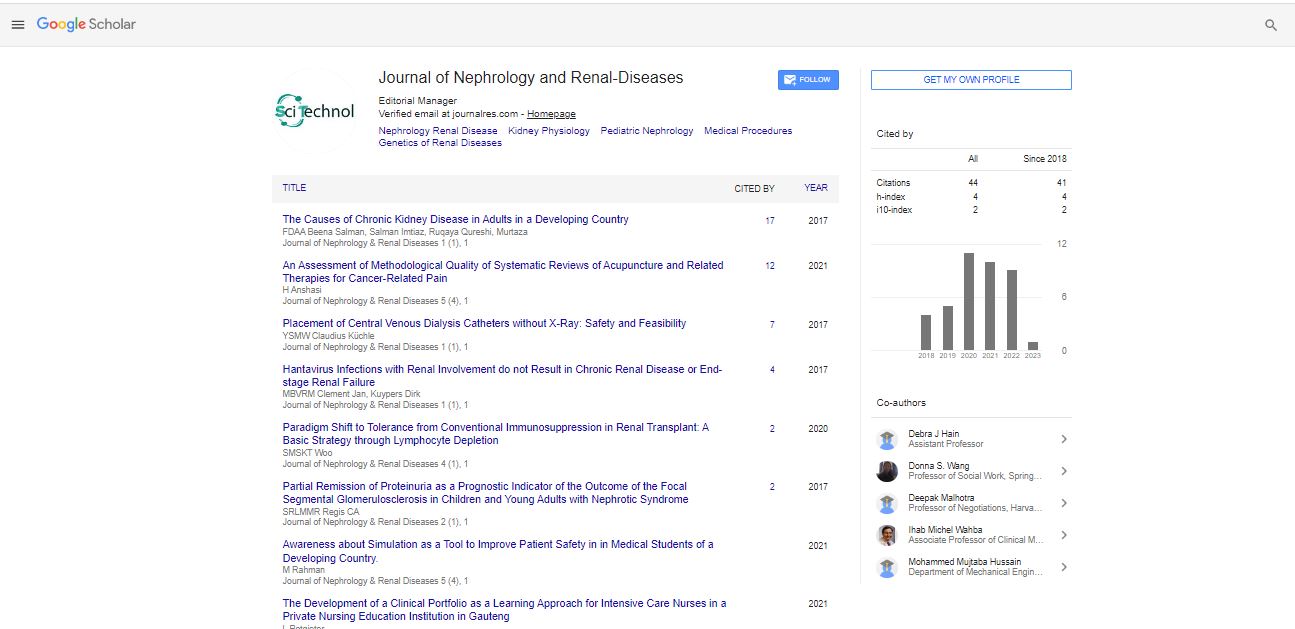Perspective, J Nephrol Ren Dis Vol: 7 Issue: 1
Sub-Specialty Focuses Renal Medicine: A Comprehensive Guide
Zheyi Shao*
Department of Life Sciences, Beijing University of Chinese Medicine, Beijing, China
*Corresponding Author: Zheyi Shao
Department of Life Sciences, Beijing University of Chinese Medicine, Beijing, China
E-mail: shaozheyi@gmail.com
Received date: 20 February 2023, Manuscript No. JNRD-23-96893;
Editor assigned date: 22 February 2023, PreQC No. JNRD-23-96893 (PQ);
Reviewed date: 09 March 2023, QC No. JNRD-23-96893;
Revised date: 16 March 2023, Manuscript No. JNRD-23-96893(R);
Published date: 23 March 2023, DOI: 10.4172/2576-3962.1000027
Citation: Shao Z (2023) Sub-Specialty Focuses Renal Medicine: A Comprehensive Guide. J Nephrol Ren Dis 7:1.
Description
Renal medicine, also known as nephrology, is a specialty that focuses on the diagnosis and treatment of diseases that affect the kidneys. The kidneys are essential organs that help remove waste and excess fluid from the body, balance electrolytes, and produce hormones that regulate blood pressure and red blood cell production. Renal medicine is a complex field that involves the study of the kidney's anatomy, physiology, and pathology. In this article, we will explore renal medicine in detail, including its sub-specialties, common conditions treated, diagnostic tests, and treatments.
Sub-specialties in renal medicine
• Renal medicine is a vast field that covers various sub-specialties, including:
Glomerulonephritis: This sub-specialty focuses on the diagnosis and treatment of inflammation of the kidney's filtering units (glomeruli).
Hypertension and diabetic kidney disease: This sub-specialty deals with the diagnosis and management of high blood pressure and diabetes-related kidney damage.
Dialysis and transplantation: This sub-specialty focuses on the treatment of patients with End-Stage Renal Disease (ESRD) by providing dialysis and transplantation services.
Pediatric nephrology: This sub-specialty focuses on the diagnosis and treatment of kidney diseases in children, including congenital anomalies, urinary tract infections, and nephrotic syndrome.
Common conditions treated in renal medicine
Renal medicine covers a wide range of conditions, including:
Acute Kidney Injury (AKI): This condition occurs when the kidneys suddenly stop working, leading to a build-up of waste and fluid in the body.
Chronic Kidney Disease (CKD): This condition occurs when the kidneys gradually lose function over time, leading to the accumulation of waste and fluid in the body.
Glomerulonephritis: This condition is characterized by inflammation of the glomeruli, which can lead to proteinuria, hematuria, and kidney damage.
Hypertension and diabetic kidney disease: These conditions can cause damage to the kidneys over time, leading to CKD and ESRD.
Diagnostic tests in renal medicine
Renal medicine uses various diagnostic tests to evaluate kidney function and diagnose kidney disease, including:
Blood tests: These tests measure the levels of creatinine, Blood Urea Nitrogen (BUN), and electrolytes in the blood, which can help determine kidney function.
Urine tests: These tests measure the presence of protein, blood, and other substances in the urine, which can help diagnose kidney disease.
Imaging tests: These tests, such as ultrasound, CT scan, and MRI, can help visualize the kidneys and detect any abnormalities.
Biopsy: This test involves taking a small sample of kidney tissue for analysis to diagnose kidney disease accurately.
Treatments in renal medicine
The treatment options for renal disease depend on the underlying condition and the severity of the disease. Some common treatments include:
• Medications, such as Angiotensin-Converting Enzyme inhibitors (ACE inhibitors) and Angiotensin Receptor Blockers (ARBs), can help control blood pressure and protect the kidneys.
• Dialysis is a treatment that helps remove waste and excess fluid from the body when the kidneys cannot do so adequately.
• Kidney transplantation is a treatment option for patients with ESRD, which involves replacing a diseased kidney with a healthy kidney from a donor.
• Lifestyle changes, such as following a low-salt diet, quitting smoking and exercising regularly, can help improve kidney function and prevent kidney disease from progressing.
Conclusion
Renal medicine is a complex and critical field that deals with the diagnosis, treatment, and management of kidney diseases. With the kidneys' an important role in regulating the body's functions, it is vital to ensure their proper functioning and treat any disease that may impair their function. Renal medicine encompasses various subspecialties, including glomerulonephritis, hypertension and diabetic kidney disease, dialysis and transplantation, and pediatric nephrology. Common conditions treated in renal medicine include acute kidney injury, chronic kidney disease, glomerulonephritis, hypertension, and diabetic kidney disease. Diagnostic tests, such as blood tests, urine tests, imaging tests, and biopsies, aid in diagnosing kidney disease accurately. Treatment options vary depending on the underlying condition and severity, and may include medications, dialysis, transplantation, and lifestyle changes. Overall, the field of renal medicine is essential in maintaining proper kidney function and improving the quality of life for patients with kidney disease.
 Spanish
Spanish  Chinese
Chinese  Russian
Russian  German
German  French
French  Japanese
Japanese  Portuguese
Portuguese  Hindi
Hindi 
